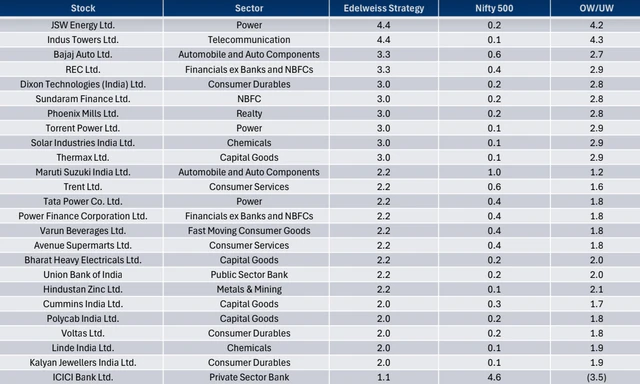Edelweiss Mutual Fund has launched a new equity scheme - the Edelweiss Business Cycle Fund. This open-ended fund, available for subscription from July 9 to July 23, 2024, aims to capitalize on market opportunities through a unique business cycle-based investment strategy.
What is a Business Cycle Fund?
Unlike traditional mutual funds that may focus on specific sectors or market capitalizations, a Business Cycle Fund aims to adapt its holdings based on the different phases of the economic cycle. The economy experiences periods of expansion (growth) and contraction. Business Cycle Funds attempt to identify these stages and invest in sectors that tend to perform well during each phase.
Edelweiss Business Cycle Fund's Approach:
Factor Investing Approach: The fund utilizes factor investing, creating three distinct baskets of quality, growth, and value stocks. This diversification helps reduce the overall cyclical nature of any single factor.
Momentum Focus: Within each basket, the fund prioritizes stocks with high momentum, resulting in a diversified portfolio of 50-60 companies.
More From This Section
Dynamic Sector Rotation: The fund strategically rotates investments across sectors at different points in the business cycle, combining momentum with fundamental analysis to optimize entry and exit points. This approach aims to generate better alpha (returns exceeding market benchmarks).
Within each basket, the fund selects the highest momentum stocks, resulting in a diversified portfolio of 50-60 stocks. The fund aims to dynamically rotate between sectors over different time periods, seamlessly combining momentum with fundamentals to enter and exit sectors, thereby generating better alpha.
How is it Different?
Traditional mutual funds may have a static investment strategy, focusing on a particular sector or size of companies. Business Cycle Funds, on the other hand, actively adjust their holdings based on the economic climate. This approach aims to offer investors exposure to sectors expected to perform well during the current economic phase, potentially leading to better returns.
Ventura Securities explains the different types of business cycles:
Business cycles are the fluctuations in economic activity that an economy experiences over a period. They typically consist of four phases:
1. Expansion: Characterised by rising economic activity and growth.
2. Peak: The zenith of economic growth before a downturn.
3. Contraction: A period of declining economic activity.
4. Trough: The lowest point before the economy starts recovering.
The Edelweiss Business Cycle Fund will follow a dynamic asset allocation approach, says Ventura Securities.
- Sector Rotation: Adjusting sector exposure based on the prevailing economic cycle. For example, increasing exposure to consumer goods and technology during expansion and shifting to defensive sectors like healthcare and utilities during contraction.
- Stock Selection: Identifying companies with strong fundamentals that are poised to perform well in the current phase of the business cycle.
“The Edelweiss Business Cycle Fund provides investors with a convenient and unique solution by implementing dynamic sector rotations. This strategy effectively addresses the common challenge of timing sector entries and exits, which investors often struggle with. Momentum has been the best-performing factor in India for many years, and when combined with other fundamental factors, it proves highly effective in generating long-term alpha. Investing across various sectors and market caps, this fund offers a robust solution for core allocation with a long-term focus," said Radhika Gupta, MD & CEO, Edelweiss Mutual Fund.
The fund will be managed by Bharat Lahoti Co-Head – Factor Investing and Bhavesh Jain Co- Head – Factor Investing.
Top 25 stocks
)
)
Investment strategy: The scheme will employ a bottom-up approach for stock selection within each market capitalization and endeavour to maintain sectoral diversification in the portfolio.
Edelweiss Business Cycle Fund: asset allocation
- Equity and Equity-Related Instruments: 80-100%
- Debt and Money Market Instruments: 0-20%
Asset allocation: The fund manager will consider macro-economic parameters, consumer sentiment and overlay it with an internal, proprietary model using fundamental and technical analysis of stocks to arrive at the portfolio which will comprehend the sectors, stocks and style which will suit the business environment.
Who should invest?
- Investors with very high risk appetite should invest in the Edelweiss Business Cycle Fund for 5 or more years.
- Risk associated: Very high level of risk.
- Benchmark: Nifty 500 TRI
The NFO is available for subscription from July 09 to July 23. The schemes will reopen for continuous sale and repurchase within five Business Days from the date of allotment.
The fund offers systematic investment solutions like SIP and SWP to create a flexible investment plan.
The minimum subscription amount is Rs 5000/- and in multiples of any amount thereafter.

)